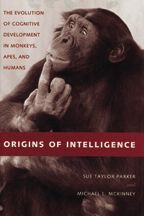
Reviews
The authors' elegant theory and comprehensive empirical synthesis of how the development of human intelligence and brain evolved opens up cascading heuristic avenues for creatively answering one of the great questions in the human history of ideas.
[Origins of Intelligence is] worthy of a prominent place on the researcher's shelf... A handy source of information on comparative cognitive abilities related to life history and brain variables.
Parker and McKinney's attempt to address the Origins of Intelligence is to be welcomed. Although the 'glittering prize' for unraveling the evolutionary history of modern human intelligence is probably still unclaimed, the authors' broad integration of ontogenetic, comparative, and evolutionary evidence is an approach that holds much promise. If you are interested in the evolution of primate cognition (whether a primatologist, paleoanthropologist, psychologist, etc.) you should read Origins of Intelligence.
A fascinating and elegantly crafted book. Seminal reading for anyone interested in how our cognitive development is inextricably linked with our evolutionary heritage. The authors argue clearly and convincingly that recapitulation is alive and well in the evolution of our brain.
Book Details
Preface
Acknowledgments
Introduction
Part I. COGNITIVE DEVELOPMENT IN HUMAN AND NONHUMAN PRIMATES
Comparative Developmental Studies of Primate Cognition
Development of Physical Cognition in Children, Apes
Preface
Acknowledgments
Introduction
Part I. COGNITIVE DEVELOPMENT IN HUMAN AND NONHUMAN PRIMATES
Comparative Developmental Studies of Primate Cognition
Development of Physical Cognition in Children, Apes, and Monkeys
Development of Logical-Mathematical Cognition in Children, Apes, and Monkeys
Development of Social Cognition in Children, Apes, and Monkeys
Development of Language in Young Children and Apes
Comparing Primate Cognition across Domains: Integration or Isolation?
Cognitive Development in the Context of Life History
Part II. THE EVOLUTION OF COGNITIVE DEVELOPMENT
Development and Evolution: A Primer
The Evolution of Human Mental Development
Cognitive Adaptations of Apes and Humans
Comparing Adaptive Scenarios for Primate Cognition
The Evolution and Development of the Brain
Cognitive Complexity and Progress in Evolution
References
Index





